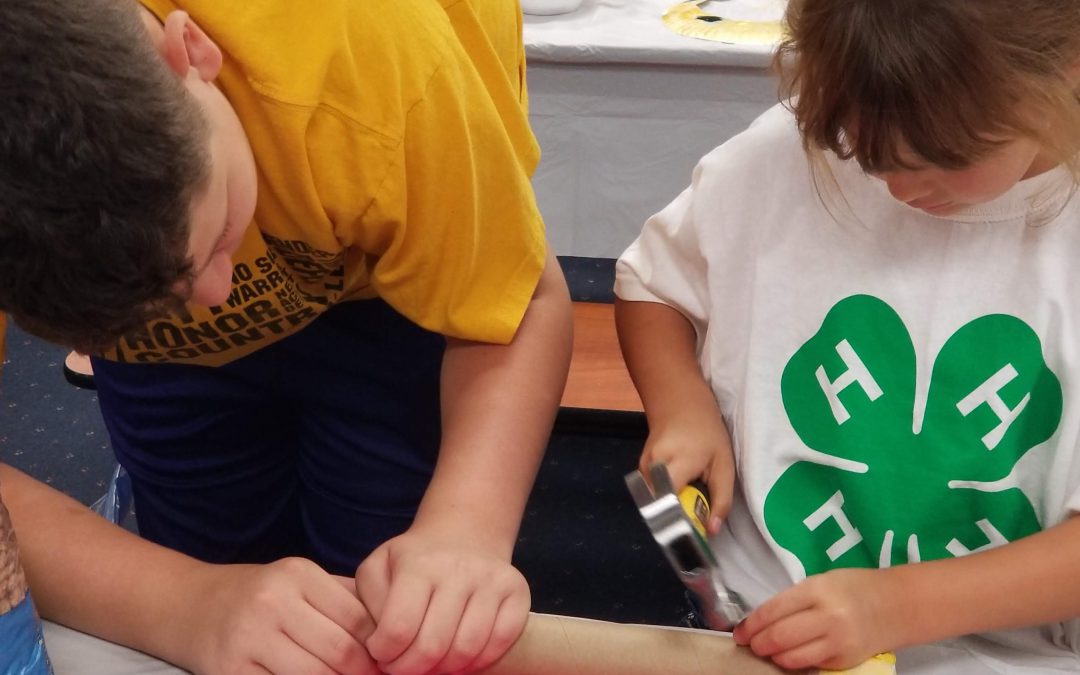
by Niki Crawson | May 19, 2023
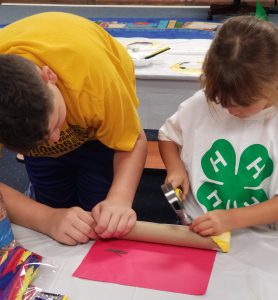
We know that younger youth look up to older youth and like to model their behaviors. We see it in siblings all the time, absorbing behaviors of their older brothers or sisters like sponges. Often times, younger youth find the attention and encouragement of older youth more relatable due to the closeness in age. Peer teaching fosters a more engaging and even symbiotic learning experience as this gives teens the opportunity to share and reinforce their own knowledge. In addition, by pairing the two age groups together in a learning environment, a sense of comradery can develop, creating a greater sense of belonging within the 4-H community. In this post, we will define peer teaching, share a few examples of how to utilize your teens as teachers and provide tips for getting peer teaching started in your clubs and other 4-H events and activities successfully.
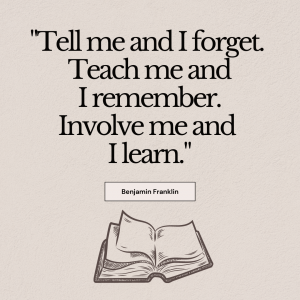
WHAT IS PEER TEACHING?
What do we mean by peer teaching exactly? It is the process of youth learning together and from each other through engaging, hands-on activities. In 4-H, we have the wonderful ability to utilize teens as volunteers and positive role models for our younger youth in our positive youth development programs. Empowering our teens as teachers for our younger members allows life skills to develop among our youth being instructed and also the instructors. The teen instructors are teaching specific topics to their peers at the same time they are strengthening their own leadership, communication, and social skills.
WHAT ARE THE BENEFITS OF PEER TEACHING?
As stated previously, one of the greatest outcomes is that the teacher and the student both gain knowledge and skills. It creates a mutually beneficial environment in which all youth can achieve personal growth and development if implemented and managed correctly. In addition, there are many other benefits of peer teaching such as:
- Peers being taught may form a quicker and better connection with teens due to communication, technology and other trends.
- An increase in peer confidence as they may feel more comfortable in asking questions, discussing topics with others closer to their age.
- Greater creativity as teens may have more innovative or modern ideas to bring to the activities.
- An increase in volunteers as teens have the ability to recruit more teens easier than typical adult volunteers.
- An increase in retention of youth as peers stay in the program and become the next generation of teen volunteers/teachers.
WHAT DOES PEER TEACHING LOOK LIKE IN 4-H?
Below are just a few programs for teens to practice the method of peer teaching in their 4-H county:
- New Members – When new youth join 4-H, it can be overwhelming at times to learn some of the 4-H activities, customs, and such. This would be a great opportunity for
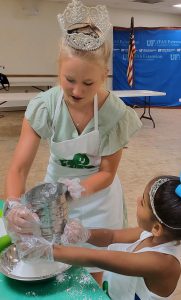 peer teaching. Have teens assigned to new members that join in order to teach them the 4-H pledge, motto, club expectations, member names, etc. This creates a greater sense of belonging and fosters a supportive environment within the club for new members to engage more quickly and successfully.
peer teaching. Have teens assigned to new members that join in order to teach them the 4-H pledge, motto, club expectations, member names, etc. This creates a greater sense of belonging and fosters a supportive environment within the club for new members to engage more quickly and successfully.
- Cloverbud Club Meetings – Utilizing your teen members in club meetings involving Cloverbuds (members ages 5-7) is a great way to incorporate peer teaching in your 4-H program. Younger members thrive off of creativity and enthusiasm which teens often portray easily. Teens can funnel this energy into teaching lessons to Cloverbuds that are engaging and interactive in a simplistic way.
- Summer Day Camps – 4-H programs often times need additional volunteers during the summer to assist with the volume of programming and youth participants. Therefore, summer is a great time to recruit teens to become peer teachers. Having teens as peer teachers helps with supervision and instruction while at the same time, allows them to stay involved in 4-H, continue to apply their life skills learned, and help the program teach life skills to other youth in the community.
TIPS TO GET PEER TEACHING STARTED IN YOUR 4-H COUNTY
What does it take to get peer teaching started in your 4-H county? Time and patience to start with. Teaching with teens is an ongoing task and will take a little effort on your part. Below are a few tips to get you started on having teens peer teach in your county:
- Identify programming that would benefit by peer teaching.
- Recruit quality teen teachers.
- Train and support teens as peer teachers.
- Assign teens appropriate roles in the peer teacher process.
- Model appropriate teaching methods in 4-H programs.
- Shadow teens in the role as peer teachers to provide support and guidance.
- Evaluate, provide feedback, and continue professional development for continued success.
Remember, peer teaching is a great way to utilize teen members in your 4-H programs. Younger youth need as many positive role models as possible in their lives. By having teen teachers take the lead in instruction in your 4-H programs, you are fostering an environment of learning, inclusivity, empowerment, and leadership.
To learn more about 4-H opportunities where teens can take the lead as teachers for their peers, please contact your local UF IFAS County Extension Office, or visit http://florida4h.org.
ADDITIONAL SOURCES:
Burse, G., Crocker, E. T., Jordan, J., McKinney, M., & Murphy, L. (2021). Teens as Teachers 4-H Project: Curriculum and Resources. UF/IFAS Extension, University of Florida. Retrieved May 1, 2023, from https://edis.ifas.ufl.edu/publication/4H432
Eckhoff, A., & Swistock, B. (2011). Staffing with Teenagers and Teens as Cross-Age Teachers. Rutgers Cooperative Extension.
by Claire Davis | May 6, 2022
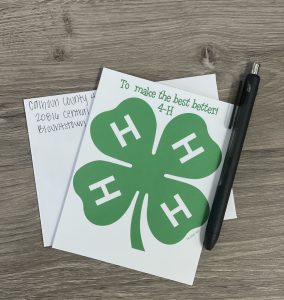 How do you know when it is appropriate to send a thank you card? Have you ever received a gift from someone? Did a volunteer donate their time for an event or for a club meeting? Are you in 4-H and someone purchased your project animal at auction? If you answered yes to any of these questions, then you should have written a thank you note to them! It does not just have to be a life changing event, such as a wedding, birthday, or baby shower, that warrants a thank you card. Whenever someone has done something nice for you, it is definitely worth sending them a thank you card.
How do you know when it is appropriate to send a thank you card? Have you ever received a gift from someone? Did a volunteer donate their time for an event or for a club meeting? Are you in 4-H and someone purchased your project animal at auction? If you answered yes to any of these questions, then you should have written a thank you note to them! It does not just have to be a life changing event, such as a wedding, birthday, or baby shower, that warrants a thank you card. Whenever someone has done something nice for you, it is definitely worth sending them a thank you card.
Writing thank you notes is a skill that many people should have, but many overlook. What exactly do you need to say in your thank you note? Here is an easy guide for a few things that you should include in your thank you note, regardless of the reason you are writing it!
Make sure that you start off by thinking of why you are writing a thank you note! Thank you notes let the individuals know that you care, that you are proud of your accomplishments, or make them feel appreciated for something that they have done for you!
-

A decorated academic cap at commencement. Photo taken 04-29-17.
Make the letter personal by starting with a salutation. Address the individual(s) by their name. If it is someone that you are well acquainted with, it is alright for you to address them by their first name. If it is someone that you are not as familiar with, stick to Mr., Mrs., Ms, and/or Miss last name. Below are a few examples of how to address someone:
Dear Aunt Renae,
Dear Lilly,
Dear Mr. and Mrs. Leonard,
- Get right to the point and express your gratitude. Some examples could be:
“Thank you so much for your generous wedding gift.”
“Thank you for the birthday present.”
“Thank you for donating your time at the Horse Club Meeting.”
“Thank you for purchasing my steer at the Calhoun County Livestock Show.”
- Maybe mention a specific detail or two. There is no need to exaggerate about their gift, but tell them what it might be used for or what you appreciate about it. Here are a few examples of things to say.
“I am so excited to get to use the birthday money on my upcoming trip to Disney World.”
“I’ve had my eye on a smoothie maker, and now I am a smoothie making machine!”
“We are saving the wedding money to help build our future home together.”
“The knowledge you shared at the meeting is incredibly valuable and the kids were soaking it up!”
“I am going to save the money from my 4-H steer project in my college fund.”
- Look ahead to the future. You may be excited about your trip to Disney World or the new smoothie machine, but make sure they know that you appreciate them or enjoyed working with them. If you are likely to spend time with them again in the future, this is a good way to move your letter towards wrapping up.***This suggestion may not apply to every letter.
“I can’t wait to have dinner with you again.”
“I’ll be up that way here in a few months and would love to see you.”
“I am interested in the position and look forward to hearing from you soon.”
“We cannot wait to have you teach us again at the club meeting next month.”
- Wrap it up with another thank you and sign off. Make sure that your letter is clear, you want to thank them for their time, donation, money, etc. You do not have to use fancy language to end your letter.
“Thank you again for thinking of us on our special day!”
“Thank you for being so generous to our organization.”
“Again, thank you for spending your time with us.”

Albert the Alligator Florida Gator mascot holding a thank you sign. Photo taken 11-16-16.
Make sure to end your letter appropriately, whether that be professionally or casually.
“Warmly,”
“With love,”
“Sincerely,”
When in doubt, write a thank you card. Your recipient will feel extra special that you want to show them your gratitude!
by Julie McMillian | Mar 12, 2021
 As we look at the ever-changing social media journey, we think how can we keep up? Honestly, we probably never do and that’s okay. Social media can be an efficient way to communicate with 4-H families and also recognize the great things 4-Hers are doing! While you should never rely on only one form of communication to connect with every age group, social media can be an effective strategy. While Facebook is not the “go-to” platform for youth, most parents and community stakeholders are on Facebook. This article covers the basics of setting up a Facebook Group for your 4-H club the right way. Facebook is an approved platform through the University of Florida to use for 4-H, but there are some guidelines that need to be followed:
As we look at the ever-changing social media journey, we think how can we keep up? Honestly, we probably never do and that’s okay. Social media can be an efficient way to communicate with 4-H families and also recognize the great things 4-Hers are doing! While you should never rely on only one form of communication to connect with every age group, social media can be an effective strategy. While Facebook is not the “go-to” platform for youth, most parents and community stakeholders are on Facebook. This article covers the basics of setting up a Facebook Group for your 4-H club the right way. Facebook is an approved platform through the University of Florida to use for 4-H, but there are some guidelines that need to be followed:
1. Ask your local 4-H agent to be an administrator with you. Two sets of eyes are better than one and they can help you follow the right path for youth protection and be a resource for correct branding and logos. Also, if your 4-H agent is an administrator, it is really easy for him or her to share posts to the county 4-H page (when appropriate).
2. Create a Facebook Group instead of a Facebook Page for your club. Unlike Facebook Pages, you can change Group privacy settings and limit who can see information. Anyone can follow a Facebook Page whereas a Group can allow only approved members to see information. We must be sensitive to the personal information we share about our youth. How do I create a Facebook group? Steps for creating a FB Group
3. Follow the emblem guidelines for the proper use of University of Florida’s 4-H name and brands. UF IFAS Extension 4-H Graphics. Don’t forget that your club needs to be chartered in order to use the 4-H Name and Emblem.
4. Know who has a publicity release in your club. Youth with no photo release should not be shared in private groups and club leaders who will share information in the group must be aware of these limitations. Participation Release
5. If social media isn’t your “thing,” enlist help from another volunteer! You could also delegate responsibilities to one of the youth officers in your club to help with posting and interactions (with supervision of course).
Now you might be thinking what should a 4-H club talk about on Facebook? How will this Group be helpful? Here are a few ideas:
- Upcoming events
- Sharing of information and questions
- Advertisement for your club
- Fundraisers
- Recognize youth (if you have parental consent)
- Pictures, videos, and articles
- Challenges and surveys
- Information from the District and State programs
4-H volunteers are the true leaders who help our youth succeed by providing meaningful experiences every time programming is delivered. Our hope is that you feel empowered to incorporate positive engagement with youth by using relevant and innovative communication as technology advances. To learn more about incorporating social media for 4-H clubs or becoming a 4-H volunteer, join us next Thursday, March 18th at 6pm central/7pm eastern for our webinar on social media for 4-H clubs. You can also contact your local UF IFAS Extension Office UF IFAS Extension Office or visit Florida4-H.org.Social Media Tips
by Yolanda Goode | May 6, 2019
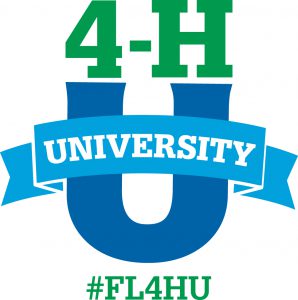
Yes, 4-University is 4 U! 4-H University is one of the premiere state events in Florida 4-H. Teens get the chance to participate in leadership workshops, explore career opportunities, interact with other 4-Hers from across the state, and have fun while learning how to better successfully engage in their community, country, and world. Below you will find useful information as well as why you should attend this flagship state 4-H event.
WHY PARTICIPATE?
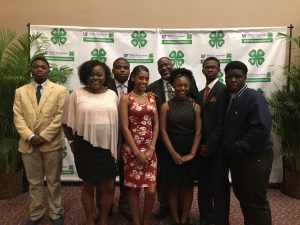
2018 Gadsden County 4-H University Delegation
- Fun: We like all things we sign up for to be fun but sometimes they turn out not to be. We assure you, this IS a FUN event.
- Network: Connect with like-minded teens from across Florida.
- Focused learning: Subject matter focused workshops offered are interesting and engaging.
- Explore: Visit an awesome college campus! There are many things to see and do at UF. It is your chance to visit a college campus.
- Dorms: Sleep in a college dorm. Yes, you and your roomies get a little taste of future dorm life.
- Leadership: True leaders know that leadership and learning is an on-going process.
- Service Learning: Giving back to others feels good. Fresh ideas keep us focused and committed.
- Goal Setting: Goals help us to expand our visions. 4-H U helps you set some goals for the future.
- Being Supportive: Fellow attendees are competitors and/or candidates running for State 4-H Officers we want to support.
- Fun: Yes, I mentioned this twice! My Gadsden County 4-H senior youth have enjoyed 4-H U for many years for all the reasons above. They stress FUN twice!
IMPORTANT REGISTRATION INFORMATION
Dates: July 29-August 1, 2019 (multi-day overnight state 4-H event)
Location: University of Florida, Gainesville
Who: Youth who are 4-H age 14-18
Registration: Opens on May 1 and closes June 30 at 11:59 pm Eastern. The cost is $275.00 for full week. Special one-day only registrations are available. Check out the website for more information.
How: Contact your local 4-H office
Learning opportunities: You do not want to be late registering so that you can have a better chance of getting your choice of track workshop: http://florida4h.org/wp-content/uploads/2019/04/4HU_2018_Workshop_Descriptions.pdf
More information: For more information, please visit this http://florida4h.org/programsandevents_/4-h-university/
CALL TO ACTION:
- Contact your local UF/IFAS Extension Office
- Begin the journey as a 4-H Member
- Engage in local programs as well as district and state: http://florida4h.org/programsandevents_/
- Read and share the other great 4-H In The Panhandle blogs by my colleagues
- Follow us on Facebook
by Melanie Taylor | May 1, 2019
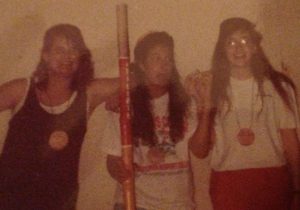
Making friends at 4-H Camp in the early 1990’s (Melanie Taylor, Gulf County 4-H Agent, on right)
4-H Summer Camp preparations are in full swing all over the state. As a 4-H agent preparing for our week of county 4-H camp, my days are busy with phone calls and emails from parents, teen counselor training, adult volunteer screenings, paperwork, paperwork and more paperwork. Although it’s busy time for me as a 4-H agent, it also allows me to reflect why I chose this career path and why there is a sense of nostalgia as I prepare for 4-H camp.
Camp Memories
I grew up in Virginia and attended 4-H camp every year from age 9-18. I was a camper that grew into a counselor-in-training and then a full-fledged counselor. Those weeks of 4-H camp were filled with hot days and warm nights, but it was worth it all for the memories I’ll have for a lifetime. I can still smell the cafeteria food and hear the sounds in the gymnasium as kids played basketball and pounded at their leather-craft projects. I still get the chills when I think about our entire camp singing around the campfire circle and patiently waiting for a canoe, filled with camp staff, to land on the lakes edge. The staff would enter the campfire circle carrying the flame and ceremoniously light the fire. I’m still connected with my 4-H camp friends through social media and/or as close friends, and we continue to share our old, blurry camp pictures from the 1990’s each year on Facebook.
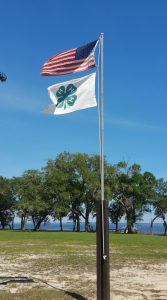
Memories to Last a Lifetime…
This is why I work hard to prepare camp for my county campers and teen counselors – I want to create similar memories for them. In 10, 20 or 30 years from now, I want them to think back on the fun moments they experienced in the Florida 4-H camping program. I want them to form friendships and make camp connections for a lifetime, whether it’s learning to kayak, fish, making arts and crafts, cooking over a campfire, singing camp songs and much more.
With all of this said, I hope you as parents will consider giving your child(ren) these special moments. The days are long, but fun, and nights are filled with campfires and hanging out with friends. When they arrive home on Friday, they’ll be exhausted but so excited to share all of the camp songs with you (prepare yourself for lots of loud, enthusiastic singing). They’ll have new friends they want you to meet and tell you camp stories they’ll always cherish.
When is Your County Camping?
In northwest Florida, there are two 4-H Camps:
4-H Camp Timpoochee in Niceville and 4-H Camp Cherry Lake in Madison.
Each county in these camping districts has one week of camp each summer. 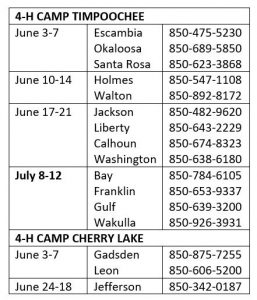 Contact your local UF/IFAS Extension Office now
Contact your local UF/IFAS Extension Office now
to find out the details and register your child for a week of fun and memories!

 peer teaching. Have teens assigned to new members that join in order to teach them the 4-H pledge, motto, club expectations, member names, etc. This creates a greater sense of belonging and fosters a supportive environment within the club for new members to engage more quickly and successfully.
peer teaching. Have teens assigned to new members that join in order to teach them the 4-H pledge, motto, club expectations, member names, etc. This creates a greater sense of belonging and fosters a supportive environment within the club for new members to engage more quickly and successfully.










